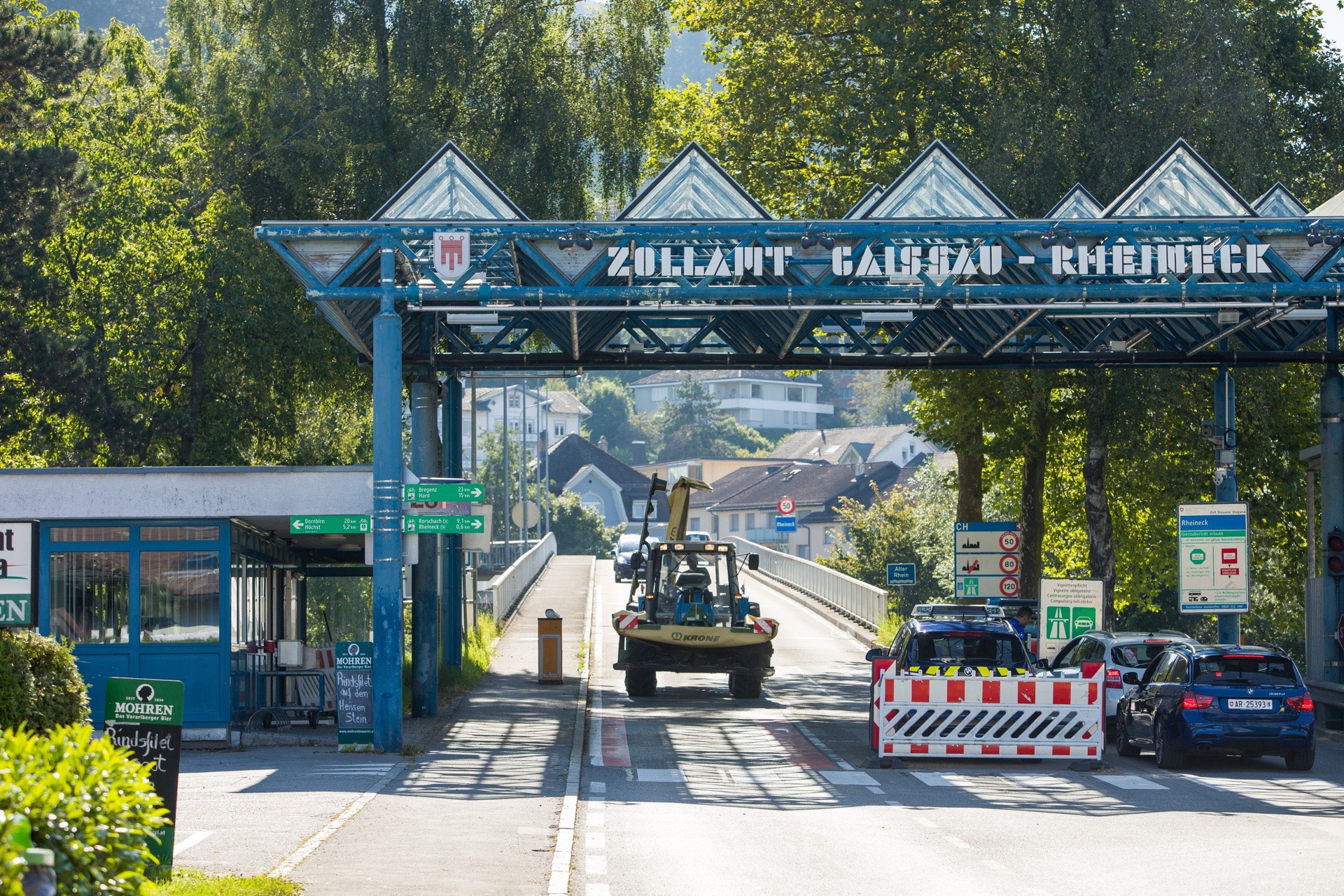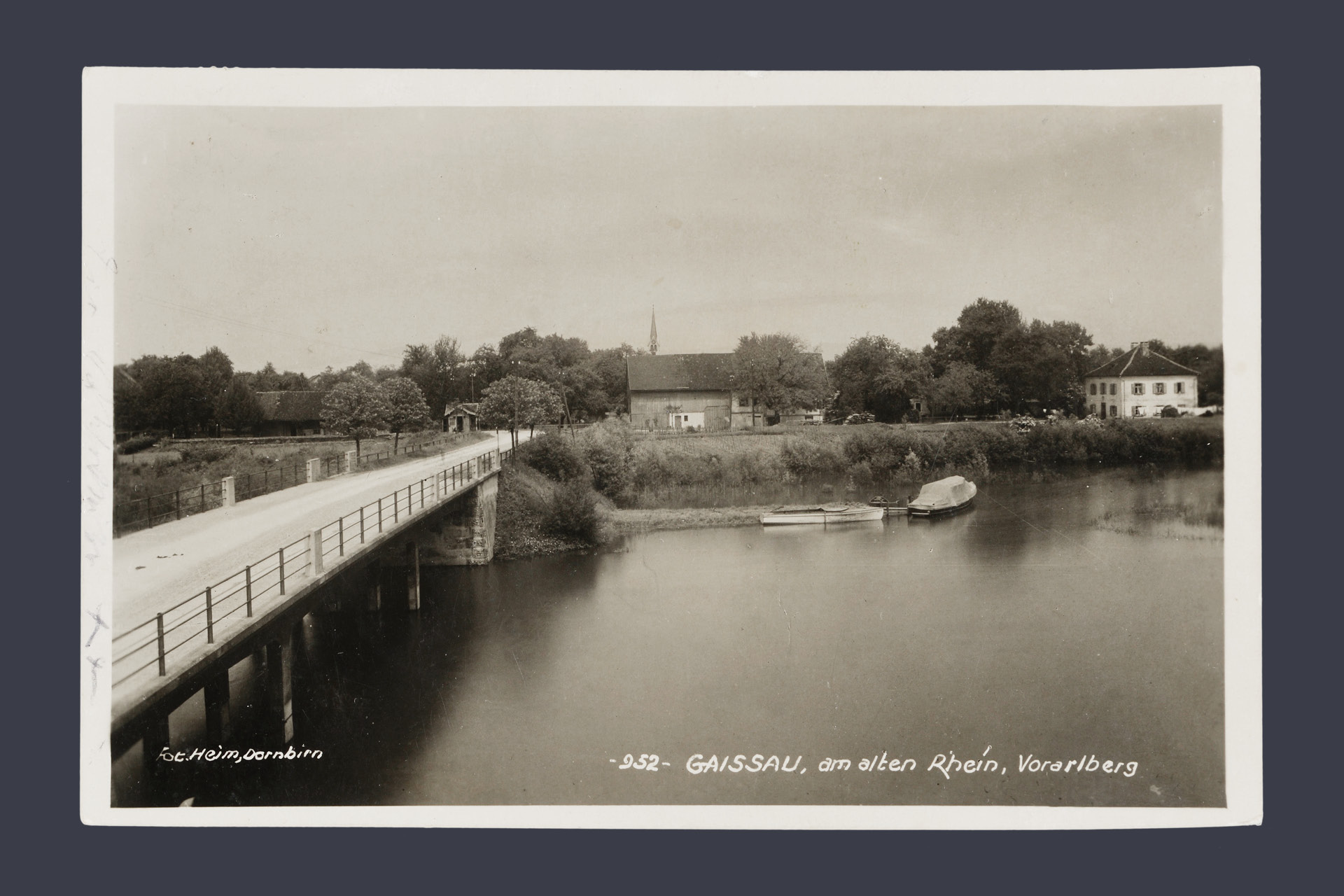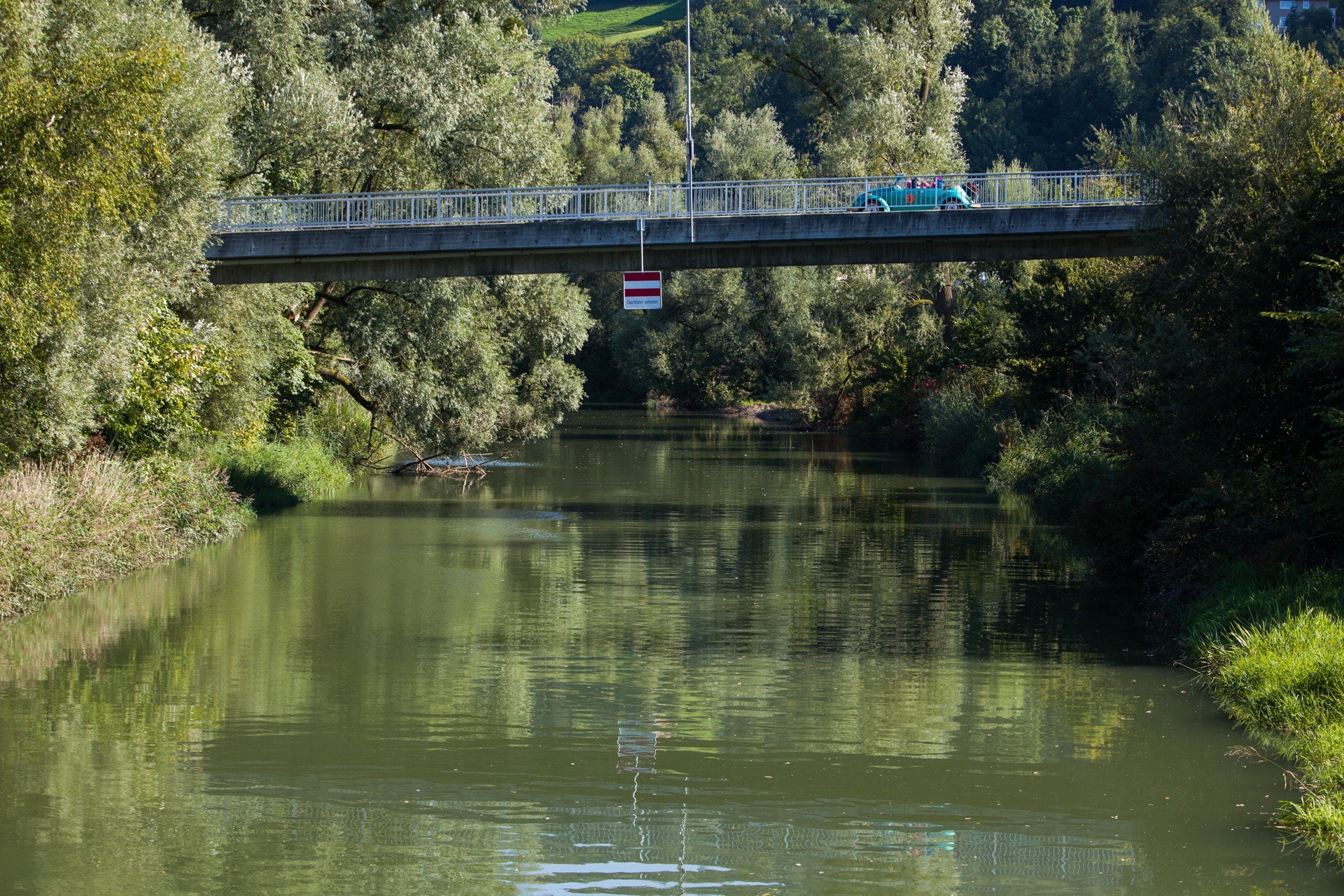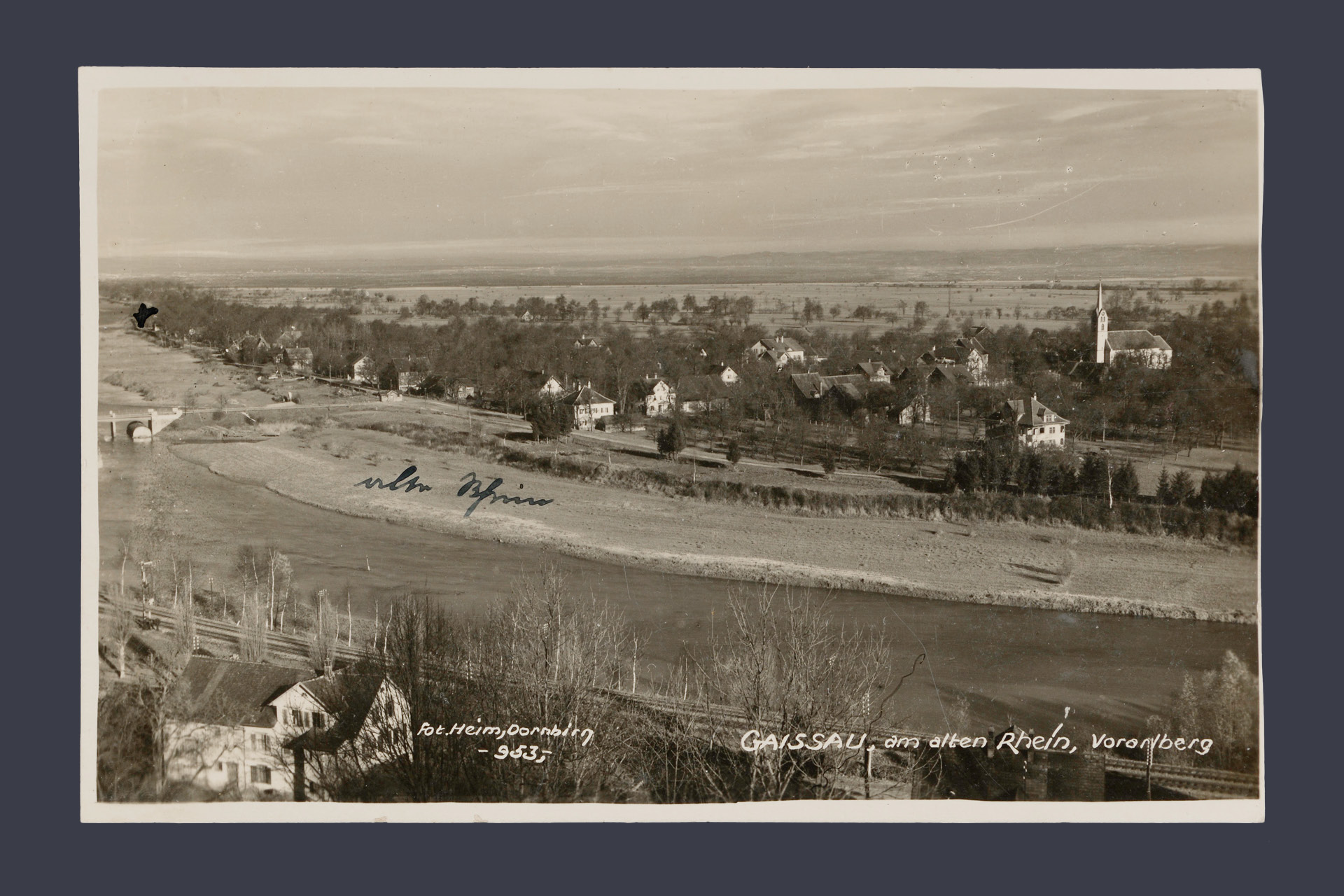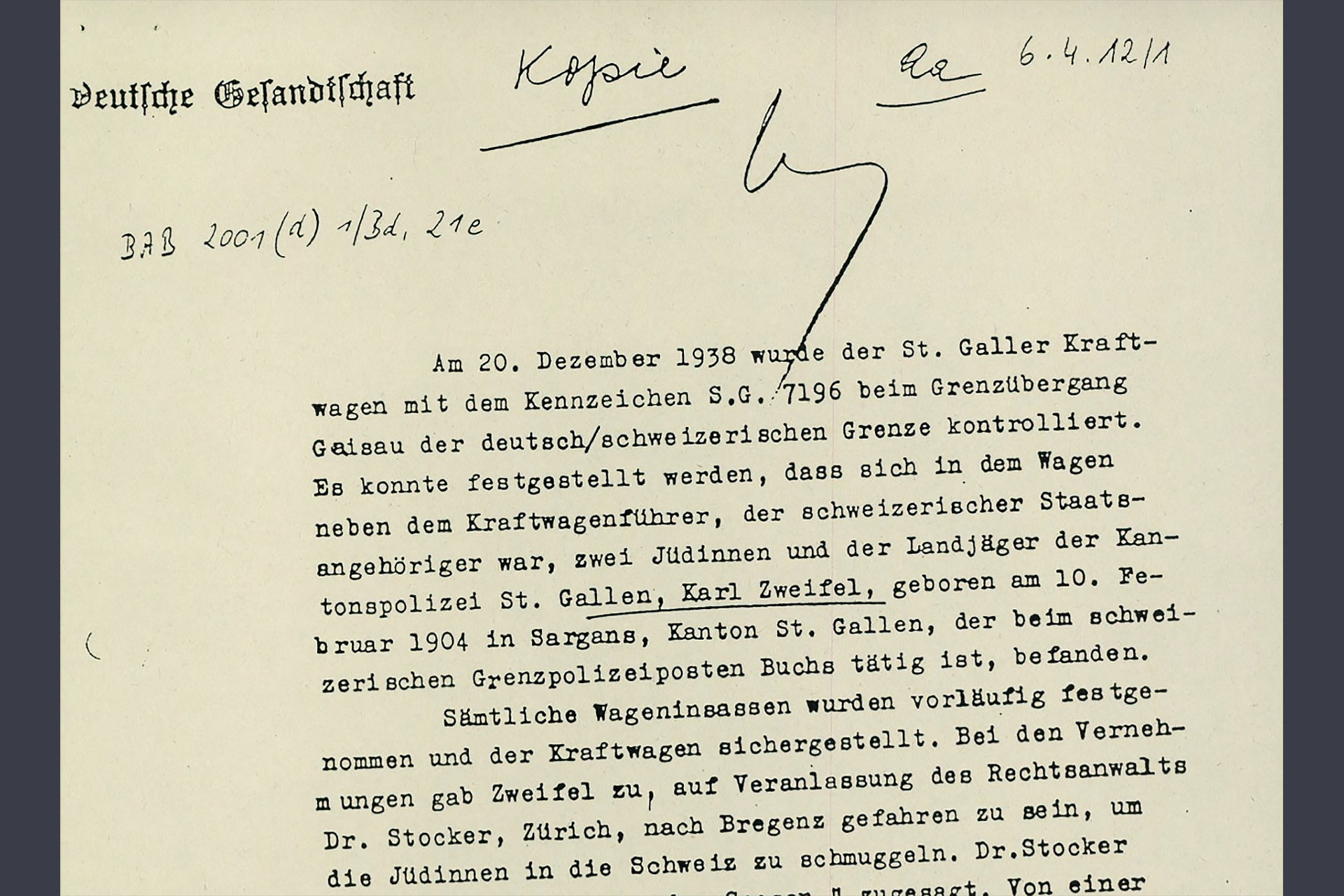Christian Dutler and Karl Zweifel> December 20, 1938
10 Christian Dutler and Karl Zweifel
Escape helpers in custody, in Bregenz and St. Gall: Christian Dutler, Karl Zweifel, Alfred Schachtler and Hans Mathys
Gaißau, December 20, 1938
Shortly before Christmas 1938, two Zurich Social Democrats drive to the Mineralbad restaurant in St. Margrethen. Hans Mathys and Werner Stocker wait there in vain for two refugees whom their comrade Karl Zweifel, a Swiss border policeman, wants to pick up from Bregenz together with the cab driver Alfred Schachtler. But no one arrives.
On December 24, 1938, the office of Heinrich Himmler, Reichsführer SS and Chief of the German Police, reports to the German Foreign Office in Berlin.
“The Border Police Commissariat Bregenz informed here by telex dated 21.12.1938: ‘In the course of yesterday evening I became confidentially aware that a motor vehicle from St. Gall (...) is located in front of a café in Bregenz. Since the motor vehicle had been seen frequently in Bregenz lately, there was an urgent suspicion that the driver of the motor vehicle was engaged in smuggling Jews into Switzerland. I then instructed all border posts in the area of the border police headquarters to check the occupants of the car. At about 8 p.m., the car wanted to cross the German-Swiss border at the Gaisau (sic!) border crossing. The occupants of the car were checked by officers of the border police station, which had been informed by telephone by the Gaisau (sic!) customs office. It was discovered that, in addition to the driver of the car, who is a Swiss citizen, there were two Jews in the car. In addition to the driver of the car, who is a Swiss citizen, two Jewish women and Karl Zweifel (...), a member of the St. Gall (Switzerland) cantonal police who works at the Swiss border police station in Buchs, were also in the car. All occupants of the car were temporarily arrested and the motor vehicle was seized. During the interrogations so far Zweifel admitted to having driven to Bregenz in order to smuggle the Jewish women into Switzerland.
Dr. Stocker had promised him ‘reimbursement of expenses’. There had been no mention of a reward. In Buchs (Switzerland), he had issued border permits for the two Jewish women in false names and had put the two passports behind a garden fence on the way to the border shortly before the Gaisau (sic!) border crossing. He had not known about the 140,- RM that the Jewish women had given to the driver of the motor vehicle to take them across the border.”[1]
Zweifel's colleague Christian Dutler, also a cantonal policeman and Social Democrat, manages to get the two Swiss out of jail in Bregenz after a few days. He has to post bail of 500 francs for Schachtler. But Dutler and Zweifel are now arrested in Switzerland immediately afterwards. House searches and their release follow. The Social Democratic network, which for years had been smuggling particularly endangered political refugees from the German Reich into Switzerland, is busted.
The Social Democratic member of the government and head of the St. Gallen police, Valentin Keel, comes under pressure. Captain Grüninger's behavior has also been eyed suspiciously by the Federal Department of Justice and Police - and the head of the alien police Heinrich Rothmund - for some time. Now Keel and Grüninger are being played off against each other. In March, the elections for the government council in St. Gall are coming up.
Valentin Keel drops Paul Grüninger. He wins his election and defends his strategic position. In April, Paul Grüninger is dishonorably discharged. The trial against him follows and ends with his conviction.
What became of the two Jewish women, on the other hand, is unknown.
Recommended reading:
Stefan Keller, Grüningers Fall. Geschichten von Flucht und Hilfe. Zurich 1993 (1998);
Jörg Krummenacher, Flüchtiges Glück. Die Flüchtlinge im Grenzkanton St. Gallen zur Zeit des Nationalsozialismus. Zurich 2005.
[1] Stefan Keller, Grüningers Fall. Geschichten von Flucht und Hilfe. Zurich 1993 (1998), p. 88.
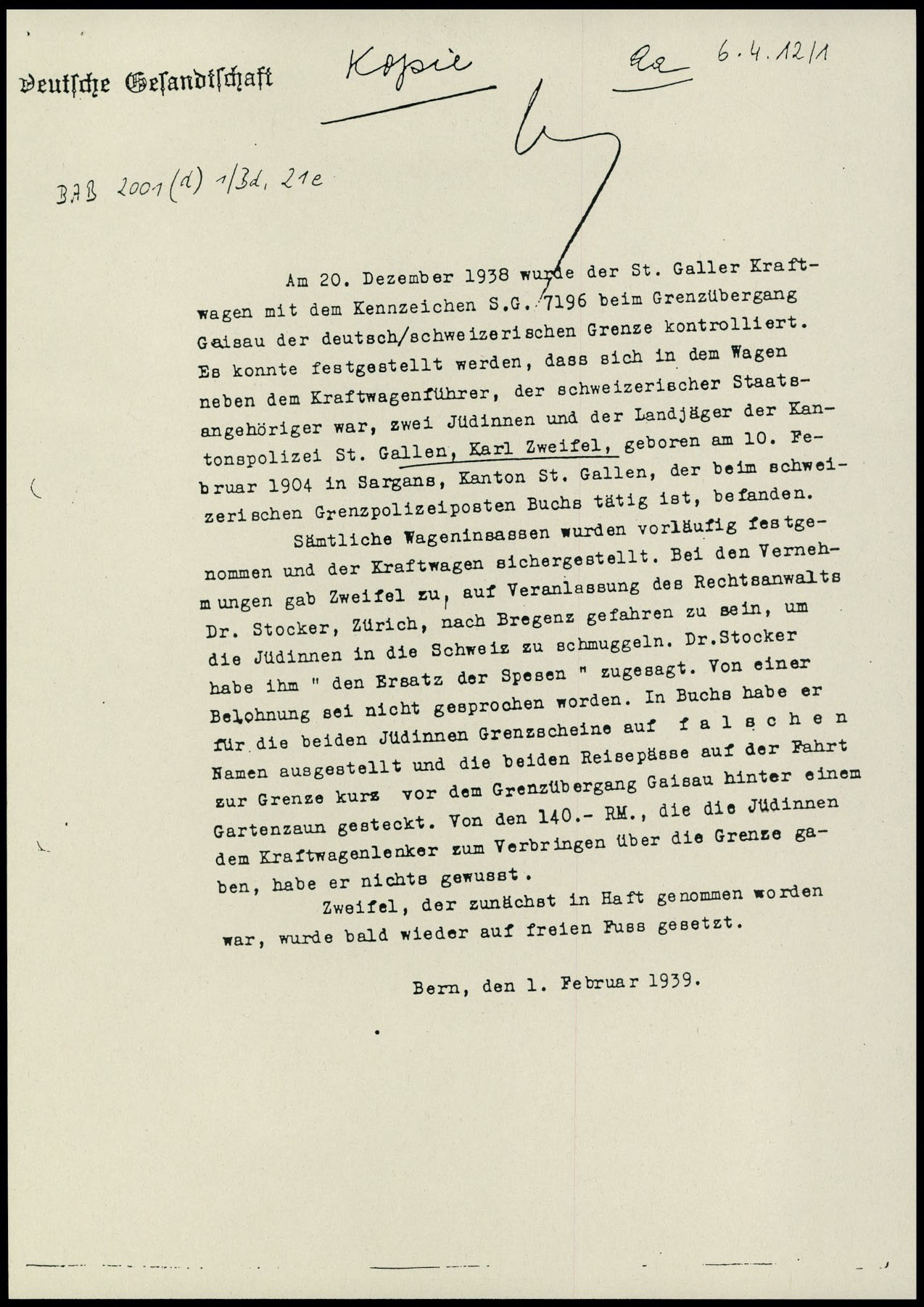
Report of the German Embassy in Bern, February 1, 1939
Archive of the Jewish Museum Hohenems
10 Christian Dutler and Karl Zweifel
Escape helpers in custody, in Bregenz and St. Gall: Christian Dutler, Karl Zweifel, Alfred Schachtler and Hans Mathys
Gaißau, December 20, 1938
Shortly before Christmas 1938, two Zurich Social Democrats drive to the Mineralbad restaurant in St. Margrethen. Hans Mathys and Werner Stocker wait there in vain for two refugees whom their comrade Karl Zweifel, a Swiss border policeman, wants to pick up from Bregenz together with the cab driver Alfred Schachtler. But no one arrives.
On December 24, 1938, the office of Heinrich Himmler, Reichsführer SS and Chief of the German Police, reports to the German Foreign Office in Berlin.
“The Border Police Commissariat Bregenz informed here by telex dated 21.12.1938: ‘In the course of yesterday evening I became confidentially aware that a motor vehicle from St. Gall (...) is located in front of a café in Bregenz. Since the motor vehicle had been seen frequently in Bregenz lately, there was an urgent suspicion that the driver of the motor vehicle was engaged in smuggling Jews into Switzerland. I then instructed all border posts in the area of the border police headquarters to check the occupants of the car. At about 8 p.m., the car wanted to cross the German-Swiss border at the Gaisau (sic!) border crossing. The occupants of the car were checked by officers of the border police station, which had been informed by telephone by the Gaisau (sic!) customs office. It was discovered that, in addition to the driver of the car, who is a Swiss citizen, there were two Jews in the car. In addition to the driver of the car, who is a Swiss citizen, two Jewish women and Karl Zweifel (...), a member of the St. Gall (Switzerland) cantonal police who works at the Swiss border police station in Buchs, were also in the car. All occupants of the car were temporarily arrested and the motor vehicle was seized. During the interrogations so far Zweifel admitted to having driven to Bregenz in order to smuggle the Jewish women into Switzerland.
Dr. Stocker had promised him ‘reimbursement of expenses’. There had been no mention of a reward. In Buchs (Switzerland), he had issued border permits for the two Jewish women in false names and had put the two passports behind a garden fence on the way to the border shortly before the Gaisau (sic!) border crossing. He had not known about the 140,- RM that the Jewish women had given to the driver of the motor vehicle to take them across the border.”[1]
Zweifel's colleague Christian Dutler, also a cantonal policeman and Social Democrat, manages to get the two Swiss out of jail in Bregenz after a few days. He has to post bail of 500 francs for Schachtler. But Dutler and Zweifel are now arrested in Switzerland immediately afterwards. House searches and their release follow. The Social Democratic network, which for years had been smuggling particularly endangered political refugees from the German Reich into Switzerland, is busted.
The Social Democratic member of the government and head of the St. Gallen police, Valentin Keel, comes under pressure. Captain Grüninger's behavior has also been eyed suspiciously by the Federal Department of Justice and Police - and the head of the alien police Heinrich Rothmund - for some time. Now Keel and Grüninger are being played off against each other. In March, the elections for the government council in St. Gall are coming up.
Valentin Keel drops Paul Grüninger. He wins his election and defends his strategic position. In April, Paul Grüninger is dishonorably discharged. The trial against him follows and ends with his conviction.
What became of the two Jewish women, on the other hand, is unknown.
Recommended reading:
Stefan Keller, Grüningers Fall. Geschichten von Flucht und Hilfe. Zurich 1993 (1998);
Jörg Krummenacher, Flüchtiges Glück. Die Flüchtlinge im Grenzkanton St. Gallen zur Zeit des Nationalsozialismus. Zurich 2005.
[1] Stefan Keller, Grüningers Fall. Geschichten von Flucht und Hilfe. Zurich 1993 (1998), p. 88.


